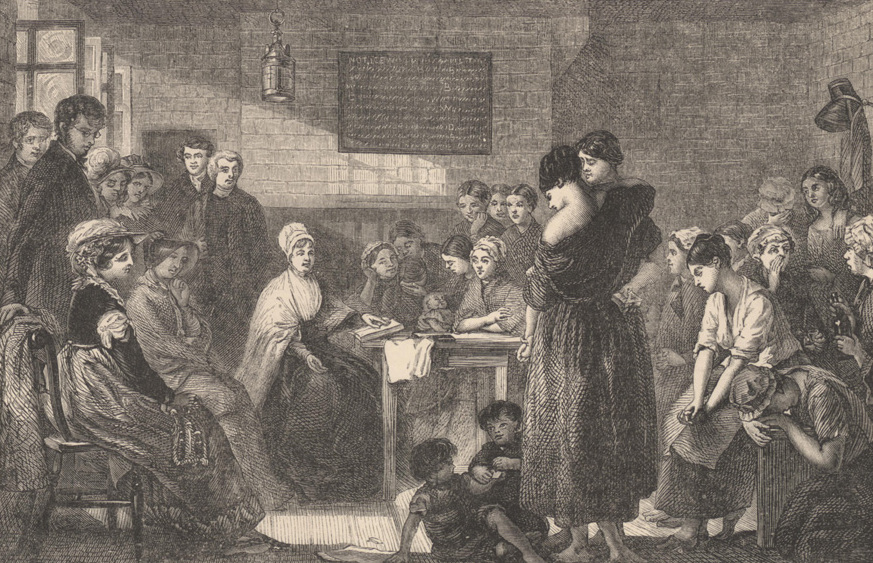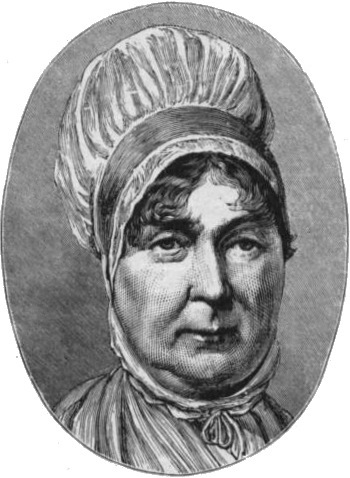The Elizabeth Fry Society is a not-for-profit social service agency that provides support for women and girls involved in the Canadian justice system. The Society provides a range of services to women who are criminalized and to women who are at risk of being criminalized. It works to reduce the impact of criminalization, to provide equal opportunities for women in the justice system and to empower marginalized women.

Wood engraving of Elizabeth Gurney Fryreading to prisoners in Newgate Prison, London (1860s).
(artwork by Jerry Barrett, courtesy John Johnson Collection of Printed Ephemera, Bodleian Library, Oxford University)
Key Terms
Criminalization
Criminalization is the process where individuals are transformed into criminals and actions are transformed into crime. This can happen when actions are made illegal through the passing of laws or as part of a social process connected to education, family and wider political and economic developments (e.g., globalization).
DecarcerationDecarceration is the process of getting and keeping people out of prison. Strategies include legal reform, counselling and education.
History and Organization
The first Elizabeth Fry Society was established in Vancouver in 1939. Canada’s first female Member of Parliament, Agnes Macphail, helped open the Toronto branch of the Society in 1952. In 1969, the Canadian Association of Elizabeth Fry Societies was formed and incorporated as a nonprofit organization in 1978. The society operates through the work of both volunteer and paid staff. It receives funding from charitable donations, provincial governments and the federal government.
The Society operates regionally in communities throughout Canada and nationally through the Canadian Association of Elizabeth Fry Societies. Each regional society is self-governing. Twenty-four affiliate societies exist in cities across Canada.

Elizabeth Fry was an English prison reformer and social reformer.
(courtesy Project Gutenberg)
Elizabeth Fry
The Elizabeth Fry Society was named after Elizabeth (Gurney) Fry, who worked to achieve prison reform in the United Kingdom. Elizabeth Fry was born on 21 May 1780 in England. Her parents were Quakers. Since Quakers believed in equality between women and men, Fry received a progressive education as a child. Fry believed that everyone possessed a “divine light” and had innate value as a human being.
After visiting Newgate Prison in London, England, Fry began work to improve the conditions for imprisoned women. At the time, the women’s section was overcrowded, with women and children sleeping on the floor. Fry advocated for prison reform. In 1818, she was the first woman to address England’s parliament when she lobbied for legislative reform. She fought to have female prison guards for female inmates. Fry founded a school for children who were imprisoned with their parents. She also established programs to teach skills to female prisoners. These programs prepared them to integrate into society after their release.
Fry also advocated for the better treatment of female prisoners who were sentenced to transportation to the British colonies such as Australia. As a result of Fry’s advocacy work, female prisoners could travel safely in closed carriages from the prisons to the boats. Fry ensured that they were sent overseas with necessary supplies, and she travelled with them to the docks. Her work helped to improve the conditions for women imprisoned in the United Kingdom.
A lifelong humanitarian, Fry later opened a nursing school to support the sick and an organization that worked with impoverished people.
Society Vision and Goals
Inspired by Fry’s compassionate approach to prison reform, the Elizabeth Fry Society works to improve the situation of Canadian women and girls involved with the justice system. Its vision is to build Canadian communities around transformative justice. To achieve this, the society focuses on research, public education and legislative reform.
The society works to educate the public about female decarceration, which is the process of getting or keeping women out of prison. This includes reducing the rate of imprisonment through counselling, educating and supporting individuals at risk of conflict with the law. The Society advocates for community integration rather than prison sentences. It helps women who are sentenced to prison terms to smoothly transition back to life in a community. Each regional society also works with other local women’s groups to combat racism, poverty and substance use.
Programs and Resources
The Elizabeth Fry Society offers many different programs and resources for criminalized, imprisoned and marginalized women across Canada. Each local society offers access to health, educational and social service programs and resources.
Since each local society is self-governing, the programs differ from one region to another. Some programs are designed specifically for women facing legal action and imprisonment. These include pretrial services, legal aid, library access and family visitation programs when in prison. Other programs focus on community integration after imprisonment. These include transitional housing, bridging employment, community kitchens, food banks and literacy tutoring. Some programs provide support to vulnerable women and girls. These include alcohol and drug counselling, relationship abuse support, family counselling, anger management and shoplifting prevention.
Each May, the CAEFS celebrates National Elizabeth Fry Week in the week leading up to Mother’s Day. During this week, the Elizabeth Fry Society aims to educate the public about the fact that the majority of women in prison are mothers who were raising children on their own before imprisonment. The theme of National Elizabeth Fry Week in 2020 was “Build Communities, Not Prisons.”
In 2020, the Society highlighted the ways that the COVID-19 pandemic exposed major flaws around safety in the prison system.

 Share on Facebook
Share on Facebook Share on X
Share on X Share by Email
Share by Email Share on Google Classroom
Share on Google Classroom